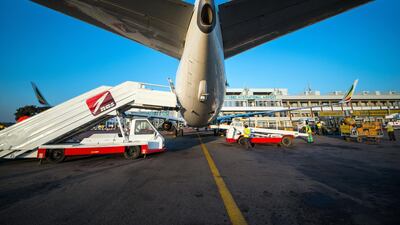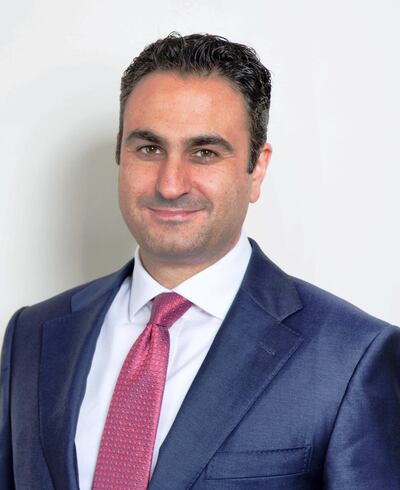Hassan El-Houry has been at the helm of National Aviation Services (NAS) for a decade, initially joining from its parent company, Kuwait’s Agility. This wasn’t part of a planned career path, coming as he did from a background in mergers and acquisitions and corporate development. He has however, found his passion in the role, growing NAS into what he calls “the largest airport services and ground handling company in Africa”.
"[It has been] a very exciting journey but there is a lot more to do in terms of aviation in the emerging markets," says the NAS Group chief executive and co-author of Fly Africa, a book that looks at the future of aviation and its economic impact on the continent.
Founded in 2003, NAS provides the entire spectrum of aviation services in the Arabian Gulf, Africa, India and Afghanistan.
At airports operated by NAS, its staff work the check-ins, sort bags, manage lounges and man the departure gates. The bus ferrying passengers to the aircraft will be a NAS bus and it is its moving staircases that help passengers embark and disembark from the aircraft. On the plane itself, NAS cleans the cabins and the toilets. A NAS driver is behind the wheel of one of its tugs to push back the aircraft. Then there is the loading of bags, checking the weight and balance of aircraft, loading, unloading and storing of cargo. It also provides VIP passenger services at many locations, such as in Abu Dhabi.
Mr El-Houry is, naturally, quite bullish about the outlook for commercial aviation in Africa. The fundamentals are compelling as Africans make up 12 per cent of the world’s population but only 2.5 per cent of the world’s passengers.
Major challenges to realise this untapped potential include a shortage of investment, regulation and infrastructure. NAS is positioning itself to take advantage of the growth in Africa with $50 million earmarked for spending over the next three years.
Africa is, of course, not a single market but many different markets. The top ten fastest-growing markets in percentage terms are Sierra Leone, Guinea, the Central African Republic, Benin, Mali, Rwanda, Togo, Uganda, Zambia and Madagascar. Each of these markets is expected to grow by more than 8 per cent each year on average, over the next 20 years, doubling in size each decade, says Mr El-Houry.
“Africa is 54 countries and 1.1 billion people. Now if you compare that to India … but it is one country. Africa is fragmented. However, Africa has a very high urbanisation rate. Today Africa has three, or four, or five mega-cities. In ten years that’s going to be about 15 mega-cities. The potential for exports from Africa ... the potential for tourists from Africa is tremendous."
Mr El-Houry's book Fly Africa highlights this trend. Its central argument is that a fast-growing Africa could change the face of the aviation industry, and the continent's rising demand for air travel could also lift Africa's economic prospects. "We don't talk about the potential for African tourists around the world," he says. "We often think of it as a one-way street. So 'into Africa' [but] we are not thinking of 'out of Africa'. That's the narrative that we need to also be changing."
The same principle goes for cargo, and may follow a similar pattern to how the UAE’s focus on building up its hub model changed aviation over the last two decades.
"Once you are able to export goods from Africa to other markets then suddenly all these markets can benefit from what Africa has to offer, which is tremendous.”
Dubai, Abu Dhabi, Istanbul, Paris and London are all hubs that are serving Africa. However, Africa has a handful of hubs including Cairo, Casablanca, Johannesburg, Addis Ababa, and the upcoming destinations such as Abidjan and Nairobi, serving the continent and the rest of the world. Currently, there are only a handful but within the next decade a lot more will come to the fore, says Mr El-Houry.
“The challenges of aviation in Africa touch upon the fact that it is dominated by international airlines – Emirates, Etihad [Airways], Turkish Airlines, British Airways, Air France-KLM – and what needs to be seen in order for us to really drive more passengers and cargo from Africa is to see the rise of African airlines. Those like Ethiopian [Airlines], like South African [Airways], like Royal Air Maroc, [and] like [Air] Cote D’Ivoire.”
First and foremost, he says, is understanding that aviation is not just planes and airports: "Think exports, think integrated cargo ecosystems, think connectivity.”
The appropriate regulation put in place is just as important.
____________
Read more:
Business Extra: How Africa will shape and be shaped by aviation
As African economies gain momentum, air travel is booming
Air freight sector takes off as Africa develops
As economy suffers, where next for South Africa?
____________
The African Union has launched the Single African Air Transport Market, with 23 signatories already on board, as of last January. It has refreshed hopes of finally opening up the continent’s skies, 20 years after the intention was first made public following the Yamoussoukro Decision to bring barriers down to support the growth of the aviation industry.
Last month, Air Mauritius said it was in talks with the carriers of Kenya, South Africa and Rwanda about creating an alliance to consolidate their networks, a move aimed at better competing with their international counterparts.
Good governance is also key to running successful airlines. Ethiopian is an example of how competent governance can support state airlines' growth, while South African Airways and Kenyan Airways are not profitable, says Mr El-Houry.
The Kenyan carrier is going through a restructuring and SAA is struggling under the weight of billions of rand in debt.
“Ethiopian Airlines has the right governance structure. If you look at their board you’ll see qualified, technical people who separate the airline from the state. It is run like an independent company,” says Mr El-Houry.
In Africa, for most governments, job creation is a priority. Aviation creates skilled jobs and transferable skills which can help meet this goal, he says.
Privatisation, which improves quality, safety and security, also creates accountability and generates revenue for a country.
“Everywhere, where we operate, we pay a percentage or a fixed fee to the government. Because of our experience we are able to create new services,” says Mr El-Houry. "Not only are we growing the size of the pie, we are giving the government a slice of the pie.”
As a private operator, NAS is unencumbered from the bureaucracy that generally comes with aviation companies controlled by the state.
“We as a company are not affiliated with any government or with any airline. That means we serve all airlines equally and we view everything commercially,” he says.
He uses the example of NAS’ experience in Ivory Coast where its airport is serving two million passengers annually compared to 700,000 four years ago, when the company first started operations in the country.
“That means we needed to be extremely responsive in terms of our training, our staffing, our investment in our equipment. Larger companies, government-owned companies are not able to do that, we are,” he says.
NAS continues to expand across Africa, launching in Uganda in November 2017 and beginning cargo operations in Liberia last year.
Mr El-Houry concedes, however, that not everything happens at break-neck speed as “aviation is not the most innovative industry” when it comes to adopting new technologies.
It is painstaking to make changes to the security and safety regulations in place, which means while there are pockets of innovation and progress, overall it is slow.
NAS has spun off its airport technologies division to serve third party ground handlers and airport services companies. It had needed to do its own R&D to meet the requirements of its own operations anyway, developing technologies in-house. Now it licenses these to other companies, such as its lounge management software. The company sees a big opportunity with small-to-medium sized providers without their own R&D capabilities.
Mr El-Houry says that airports in Dubai and Abu Dhabi – especially with the new Midfield Terminal coming – are prime examples of new technologies and innovations getting adopted quickly and put to use to enhance the passenger experience.
Not every country is the same, he says and there is a need for the industry, worldwide, to move together to properly benefit passenger and customer experiences.
“The UAE generally is a leader when it comes to aviation in all facets. The UAE has invested a lot in aviation, in R&D for aviation, in building two airlines that are really leaders on the world stage when it comes to aviation.”



